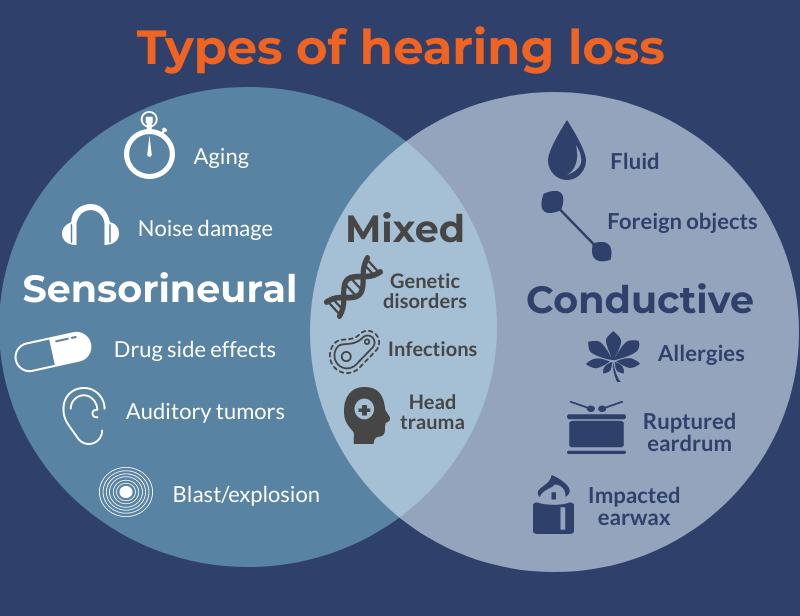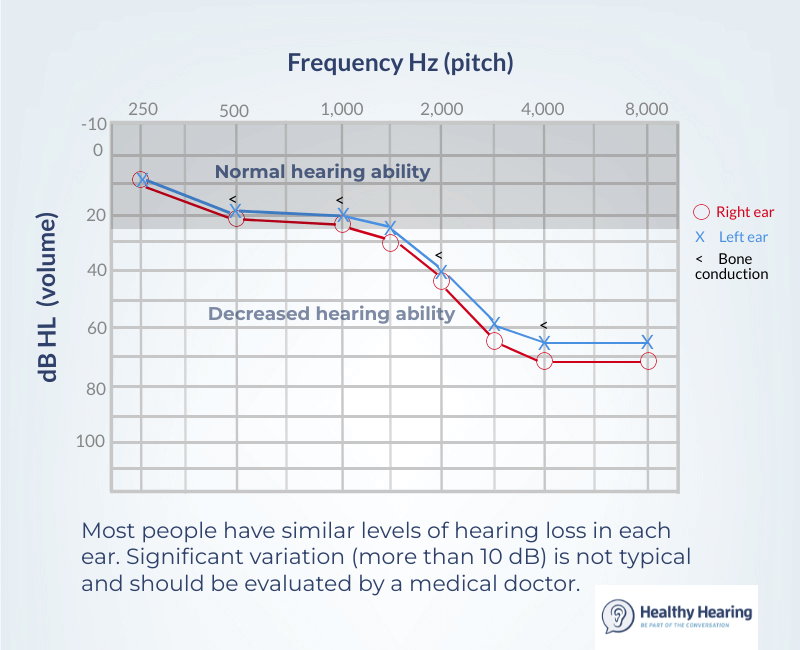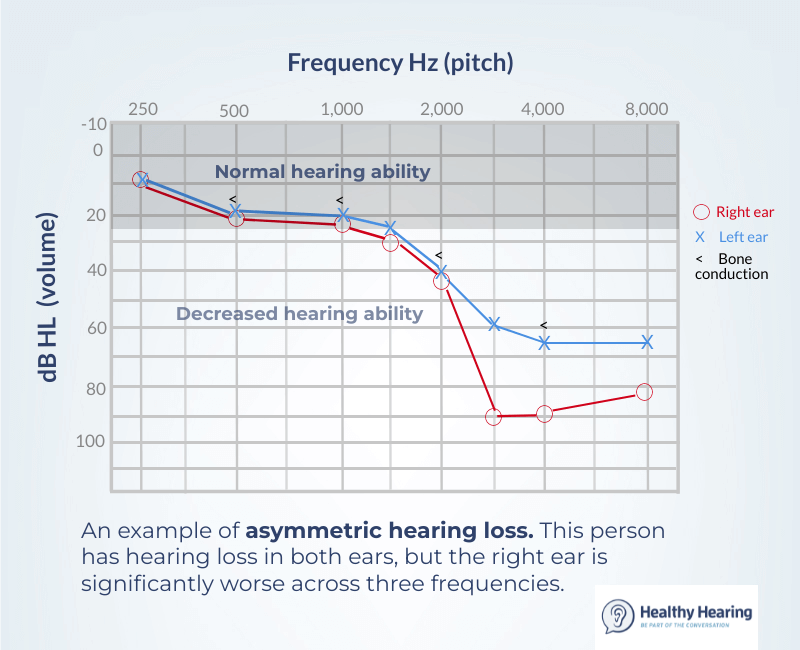|
www.HealthyHearing.com |
Why is my hearing loss worse in one ear?What you should know about asymmetrical hearing loss
Contributed by Joy Victory, managing editor, Healthy Hearing When someone has hearing loss in both ears—but one ear is worse than the other—it is referred to as "asymmetrical hearing loss." Other names include "interaural asymmetry" and "asymmetric sensorineural hearing loss." For most people with hearing loss, the left and right ears have similar patterns of hearing ability. If your hearing test reveals asymmetrical hearing loss, your hearing care provider may refer you to an ENT (ear, nose and throat doctor) before she fits you with hearing aids. That's because having different levels of hearing capability between the ears could signal an underlying medical condition. Let's take a look at the causes of uneven hearing loss between the ears and how hearing care providers can help with treatment. Slight asymmetrical hearing loss is normalDuring a hearing test, your hearing specialist, usually an audiologist or hearing instrument specialist, will carefully measure your ability to hear volume and frequency (pitch) in each ear. The results are then mapped on an audiogram. The right ear is mapped with a red line, and the left ear with a blue line. The plotted lines for both ears should be relatively similar to each ear, as shown here:
When is it cause for concern?If there is more than about 10 decibels (dB) different across at least three frequencies, "there is likely a specific reason," explained audiologist Mandy Mroz, AuD, and President of Healthy Hearing. "A hearing care professional should refer for more testing if they can't establish why there's a difference between the two ears." The same is true for tinnitus, or ringing in the ears. If it's worse in one ear, it should be investigated by a doctor. Many of the same underlying conditions for asymmetric hearing loss can cause asymmetric tinnitus, Mroz explained.
Causes of asymmetrical hearing lossThere are many possible causes, ranging from common (noise damage) to rare (tumors). Often there is overlap, too, with a person having multiple problems causing uneven hearing loss between the ears. That's why a thorough diagnostic workup by a physician is so important. Let's take a look at possible reasons: Shooter's ear and other noise exposureThere may be an obvious lifestyle reason why one ear is worse than the other. Sometimes it's occupational in origin. For example, military service members and hunters are at risk of "shooter's ear" from exposure to gunfire, a unique type of noise-induced hearing loss that affects one ear more than the other. Ear infection or inflammationHave you had a cold or sinus infection recently? Noticed an earache? This can temporarily worsen hearing in one ear more than the other. But if you also suffer (or suffered) from chronic middle ear infections either as a child or adult, you may develop permanent uneven hearing loss due to weakened bone structures. Earwax impactionCerumen impaction, or impacted earwax, can also lead to differing levels of hearing loss in each ear. Earwax build up that affects hearing, causes pain and must be treated by a physician is pretty common. Often the cause is from people trying to clean their ears in the wrong ways. It's easy for a hearing care provider to spot impacted earwax. If you suspect that you have hearing loss due to earwax, you should visit your primary care physician first; he or she might recommend home remedies to try for removing excess ear wax buildup before you try professional ear cleaning. Meniere's diseaseMeniere's disease is an autoimmune disorder that disrupts the pressure in the inner ear, usually in one ear only. This leads to vertigo, ear stuffiness, tinnitus and fluctuating hearing loss that usually gets progressively worse over time. It is one of the more common ways people can develop different levels of hearing between the ears. Otosclerosis and other bone disordersOtosclerosis causes the bones in the middle ear to harden and stop being flexible, which reduces their ability to vibrate, damaging sound quality. It often runs in families and is more common in younger white women. Another condition, known as congenital stenosis, narrows the ear canal and can cause hearing loss to be worse in one ear vs. the other. Acoustic neuromaThough they are rare, tumors can cause differences in hearing ability between ears. The most common type of tumors that can cause hearing loss, called vestibular schwannoma or acoustic neuromas, are benign and slow-growing. They affect hearing by growing on the nerve leading from the brain to the inner ear. Because those nerves account for both balance and hearing, acoustic neuromas may cause both dizziness and hearing loss. If you have these symptoms, you should visit your primary care physician. A combination of causes or "dual diagnosis"
affects the bones and physical structures. If you have a combination of hearing loss types, you may end up with hearing loss that's worse in one ear. The extent of severity can vary widely. Some people have hearing loss for multiple reasons, and experience both sensorineural and conductive types of hearing loss. For example, if you experienced a traumatic brain injury one one side of your head, and later develop age-related hearing loss, you may have hearing loss in both ears, but your hearing in the injured ear is worse. Sudden single-sided hearing lossOften occurring without warning, sudden sensorineural hearing loss in one ear should never be ignored. It's considered a medical emergency. It can have many causes, but one of the most common reasons is a viral infection of the hearing nerve. Get to your doctor right away if you're suddenly struggling to hear from one ear. How asymmetrical hearing loss affects the way you hearThis will vary widely depending on your unique circumstances and degree of hearing loss. If one ear is significantly worse than the other, for example, you may experience the "head shadow" effect and other unique issues that come with unilateral hearing loss, also known as single-sided deafness. Hearing aid fitting for asymmetrical hearing lossYour treatment options will depend on the cause and degree of your hearing loss. Most likely, hearing aids, bone-anchored hearing devices or cochlear implants will be the recommended treatment. This is a more complicated form of hearing loss, and it may take some trial-and-error to find the right hearing solution for you. The goal is to find a solution that balances the signals coming to each ear so you can perceive sound as "normally" as possible. The difficulty will increase with the difference in hearing ability between ears. With modern programmable hearing aids, an audiologist may be able to customize the settings on each side to compensate for the worse ear. However, if the hearing loss is too great in one ear (or vice versa, one ear is completely normal), bone-anchored hearing devices might be a better solution. For that reason, it's wise to see an experienced audiologist who works in tandem with an ENT. Patience is keyIf you need a hearing care provider, searching our hearing clinic directory is a good first step. "Be patient when you're trying hearing aids for asymmetrical hearing loss," Mroz said. "You will likely need more adjustments to get the balance set for your unique loss, and it will take a little longer for your brain to put the amplified signals together in your head. But it will be worth it. In addition to the health benefits of wearing hearing aids, it will become easier to localize sounds when your asymmetrical hearing loss is treated." Joy Victory, managing editor, Healthy Hearing
Related Help Pages:
Hearing loss Symptoms Types Causes Tests Children's hearing loss Noise-induced hearing loss
|
Featured clinics near me
Earzlink Hearing Care - Reynoldsburg
7668 Slate Ridge Blvd
Reynoldsburg, OH 43068

Find a clinic
Need a hearing test but not sure which clinic to choose?
Call 1-877-872-7165 for help setting up a hearing test appointment.




 Joy Victory has extensive experience editing consumer health information. Her training in particular has focused on how to best communicate evidence-based medical guidelines and clinical trial results to the public. She strives to make health content accurate, accessible and engaging to the public.
Joy Victory has extensive experience editing consumer health information. Her training in particular has focused on how to best communicate evidence-based medical guidelines and clinical trial results to the public. She strives to make health content accurate, accessible and engaging to the public.